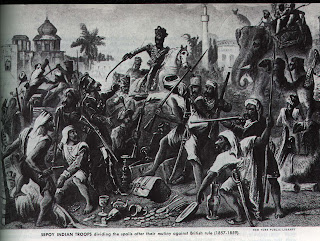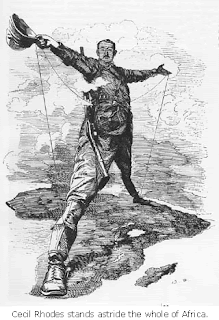3 Things that I learned from this chapter:
1. Europeans used religious arrogance to justify invading countries. They stated that they were going to "Christianize" the "heathens".
2. Imperialism differed from the Age of Exploration because in the past the reasons for conquest were "God, Glory, Gold", and during this time they were "Christianity, Commerce, Civilization".
3. Economic Imperialism was when a country was independent but controlled by private outside interests rather than another government.
2 Things I found interesting:
1. India was considered the "jewel in the crown" and the most valuable colony to Britain.
2. It seemed like it was extremely too easy for these European nations to take over sections of Africa and Asia.
1 Question that I still have:
Wasn't there any opposition to the blatant racism that the European powers were showing?
Sunday, March 6, 2011
Spotlight On: The Suez Canal Today!!!
The Suez Canal is 120.11 miles long, 79 feet deep, and 673 feet wide. It is owned and maintained by the Suez Canal Authority of Egypt. Admiral Ahmed Ali Fadel is the current president of the SCA. It is used very often by ships today because it is the fastest way to get from the Atlantic to the Indian Ocean. It is also an important source of income for Egypt because the boats that travel the canal pay a tax to use it. Today it is considered one of the world's most important waterways, as it serves as a two-way transport route between Europe and Asia.
Current Uprising: Bahrain
Shiite protesters are currently against the Sunni government, and say that there is discrimination against the majority Shia population. The opposition groups Wefaq and Waad have been organizing protests. The citizens want a democracy rather than the monarchy they are now governed by, and one protester stated “We want a new government, people need to govern the country". Currently, the barenitas elect a parliament, but it has few powers and most decisions are made by an elite that revolves around the Al Khalifa family. Protesters have been violently repressed, with hundreds wounded and several killed. So far, no major changes to the government have happened as a result of the uprising.
The Sepoy Mutiny (1857)

This mutiny took place in India, one of Britain's most treasured colonies. What first started this huge uprising was the Enfield rifles that the sepoys, or Indian soldiers under British rule, were using. They heard that the cartridges for these guns were greased in pig and beef fat. This was incredibly insulting to the sepoys because they were all either Muslin or Hindu. Muslims regard the pig as sacred, and Hindus feel the same about cows. This set them off because the soldiers had to rip open the cartridge with their teeth. Because of their outrage, the sepoys mutinied and eventually it became an organized rebellion, where they took over Delhi and Kanpur. The mutiny was eventually violently crushed by British troops, who took back control over both Delhi and Kanpur.
US Event: Plessy v. Ferguson
This court case decided that "seperate but equal" facilities on intrastate railroads were constitutional. Because of this decision, other facilities around the country now had legal foundation to support their segregation of blacks and whites. "Seperate but equal" was the standard in America until 58 years later, with the Brown v. Board of Education case. I felt that this was almost the opposite of the so-called "white man's burden" that was the justification for imperialism in Europe at the time. America was showing white dominance over blacks, but they were citizens of their own country. The US blatantly said that blacks did not deserve the same things that whites deserved, and pushed to have this justified.
US Event: Dawes Severalty Act of 1887
This law allowed for the president to break up the current Indian reservation land into small areas to be given out to individuals according to a specific formula. The Indians were also required to become US citizens, and if they refused, they were not given land. The Dawes Severalty Act shrunk the amount of land occupied by American Indians by a great deal because of the specific amounts of land given to each person. All of the extra land was then sold to settlers and corporations. This event connects to Europe at the time because it shows that America was also becoming Imperialist to an extent. The US did not care at all about the Indians no matter how much they said that they did. They shoved them off of their own land and used it to make money by selling it to white settlers.
Is the US imperialistic? Has it ever been?
I believe that the US has been imperialistic to some extent, but is not completely imperialist today, for three reasons:
1. The United States is a member of the United Nations.
2. When the earthquake in Haiti recently happened, the US as a whole made a huge effort to send supplies and volunteers there to help the people as much as possible.
3. The invasion of Iraq was not imperialist because there was no intention of taking over the country, or using it for it's resources. The US was there to intervene in violence and to find Saddam Hussein and any nuclear weapons.
There are also reasons that the US could be considered imperialist at some points in time:
1. In 1898 Puerto Rico was invaded by the US during the Spanish-American war, and though today it does have a republican government, Its current powers are all delegated by the United States Congress and lack full protection under the United States Constitution.
2. During the late 19th and early 20th centuries, the US invaded Latin American countries 32 times. Roosevelt's justification for this was to stop the "chronic wrongdoing" in the Western Hemisphere.
3. The US was part of the overthrow of the monarchical government in Hawaii, and then annexed it to be included as a US state.
1. The United States is a member of the United Nations.
2. When the earthquake in Haiti recently happened, the US as a whole made a huge effort to send supplies and volunteers there to help the people as much as possible.
3. The invasion of Iraq was not imperialist because there was no intention of taking over the country, or using it for it's resources. The US was there to intervene in violence and to find Saddam Hussein and any nuclear weapons.
There are also reasons that the US could be considered imperialist at some points in time:
1. In 1898 Puerto Rico was invaded by the US during the Spanish-American war, and though today it does have a republican government, Its current powers are all delegated by the United States Congress and lack full protection under the United States Constitution.
2. During the late 19th and early 20th centuries, the US invaded Latin American countries 32 times. Roosevelt's justification for this was to stop the "chronic wrongdoing" in the Western Hemisphere.
3. The US was part of the overthrow of the monarchical government in Hawaii, and then annexed it to be included as a US state.
Friday, March 4, 2011
US Imperialism: Political Cartoon
This political cartoon shows the different nations that the United States took over, and their effect on each nation. It shows that after the United States "rescued" them, they were far better off. The bottom half also shows the different people in expensive and sophistocated clothes, showing that the US improved their economies and made them more civilized. I think that the artist may have meant this cartoon to be sarcastic, because obviously everything was not perfect in these nations after the United States came into the picture. I would agree with this opinion, because the US was just trying to be a part of what every other major power at the time was doing - gaining land and resources.
Political Cartoons
Many imperialists argued that it was the "white man's burden" to go into lesser developed countries and bring them into civilization by teaching them western ways. This cartoon shows different nations being carried by Africans and Indians. The artist obviously wants to show that the saying "white man's burden" is just a farce for powerful countries taking over smaller ones and using the people there to get what they want. I also agree with this; the powers were just using these poor nations for their own benefit, and not trying to better their lives like they said.
This cartoon depicts Britain purchasing the Suez canal, which was considered the "key" to fully controlling India. The artist wants to show just how important this canal was, which was very true. It was just another part of Britain trying to take over as much as possible to benefit their trade and economy.
Introduction
This blog covers chapter 26: Imperialism. It covers the time period in European history when many European powers were focused on spreading their empires and gaining valuable materials from the surrounding nations. There were several different methods in entering a country, but the justification for this remained the same in almost all situations. Bigger powers stated that they were trying to "civilize" the countries around them, though their main goals were actually to take over their resources, and even use their citizens as forced labor to gain them. Through this blog, I hope to cover how people viewed Imperialist goals, some important events, and what the United States was experiencing during this time period.
Essential Question: What were the motives that caused European nations to engage in imperialistic activities?
Answer: The major European powers wanted to gain valuable resources like coal and diamonds easily. They discovered that places like Africa and India were rich in these resources, and had "uncivilized" people that they could use for cheap or even forced labor. The Europeans also believed that they were superior to these other people, and therefore deserved to take these resources while civilizing this unprivileged people.
Essential Question: What were the motives that caused European nations to engage in imperialistic activities?
Answer: The major European powers wanted to gain valuable resources like coal and diamonds easily. They discovered that places like Africa and India were rich in these resources, and had "uncivilized" people that they could use for cheap or even forced labor. The Europeans also believed that they were superior to these other people, and therefore deserved to take these resources while civilizing this unprivileged people.
Subscribe to:
Posts (Atom)








